
Youtube has a really nice RSS feature that is extremely well hidden.
If you postfix a Channel ID to
https://www.youtube.com/feeds/videos.xml?channel_id=<id goes here>
you get a really nice Atom 1.0 (~RSS) feed for your feedreader.
Unfortunately the Channel ID is hard to find while you are navigating Youtube with usernames in the URL.
E.g.
https://www.youtube.com/c/TED is TED's channel, full of interesting and worth-to-watch content (and some assorted horse toppings, of course).
But you have to read a lot of ugly HTML / JSON in that page to find and combine
https://www.youtube.com/feeds/videos.xml?channel_id=UCAuUUnT6oDeKwE6v1NGQxug
which is the related RSS feed.
Jeff Keeling wrote a simple
Youtube RSS Extractor that does well if you have a
../playlist?... or a
.../channel/... URL but it will (currently) fail on user name channels or Youtube landing pages.
So how do we get the Channel ID for a Youtube user we are interested to follow?
Youtube has a great API but that is gated by API keys even for the most simple calls (that came only with v3 of the API but the previous version is depreciated since 2015)
1:
dl@laptop:~$ curl 'https://www.googleapis.com/youtube/v3/channels?part=contentDetails&forUsername=DebConfVideos'
"error":
"code": 403,
"message": "The request is missing a valid API key.",
"errors": [
"message": "The request is missing a valid API key.",
"domain": "global",
"reason": "forbidden"
],
"status": "PERMISSION_DENIED"
Luckily we can throw the same (example) user name
DebConfVideos at
curl and
grep:
dl@laptop:~$ curl -s "https://www.youtube.com/c/DebConfVideos/videos" grep -Po '"channelId":".+?"'
"channelId":"UC7SbfAPZf8SMvAxp8t51qtQ"
So
https://www.youtube.com/feeds/videos.xml?channel_id=UC7SbfAPZf8SMvAxp8t51qtQ is the RSS feed for DebConfVideos.
We can use individual Youtube video URLs as well. With the hack above, it'll work to find us the Chanel ID from a Youtube video URL:

Now, some user pages may have multiple valid RSS feeds because they contain multiple channels.
Remember the TED page from above? Well run:
dl@laptop:~$ curl -s "https://www.youtube.com/c/TED" grep -Po '"channelId":".+?"' cut -d \" -f 4 while read -r YTID ; do echo -n "Youtube-ID: $YTID " ; curl -s "https://www.youtube.com/feeds/videos.xml?channel_id=$YTID" grep -m 1 -P -o "(?<=<title>).+(?=</title>)" ; done
This will iterate through the Channel IDs found and show you the titles. That way you can assess which one you want to add to your feedreader.
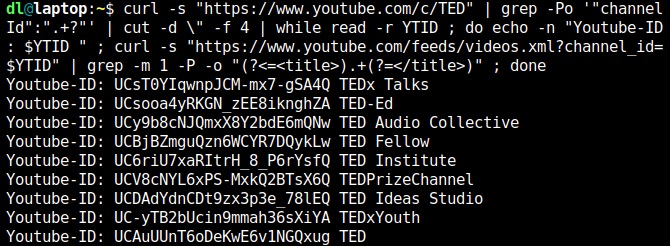
You probably want the last Channel ID listed above, the non-selective "TED" one. And that's the one from the example above.
Update
02.06.2022:
smpl wrote in and has the much better solution for the most frequent use cases:
You can also use get a feed directly with a username:
https://www.youtube.com/feeds/videos.xml?user=<username>
The one I use most is the one for playlists (if creators remember to
use them).
https://www.youtube.com/feeds/videos.xml?playlist_id=<playlist id>
For the common case you don't even need the channel ID that way.
But it is also conveniently given in a
<yt:channelId> tag (or the topmost
<id> tag) within the Atom XML document.
Thanks, smpl!
 Thunderbird, srsly?
Thunderbird, srsly?

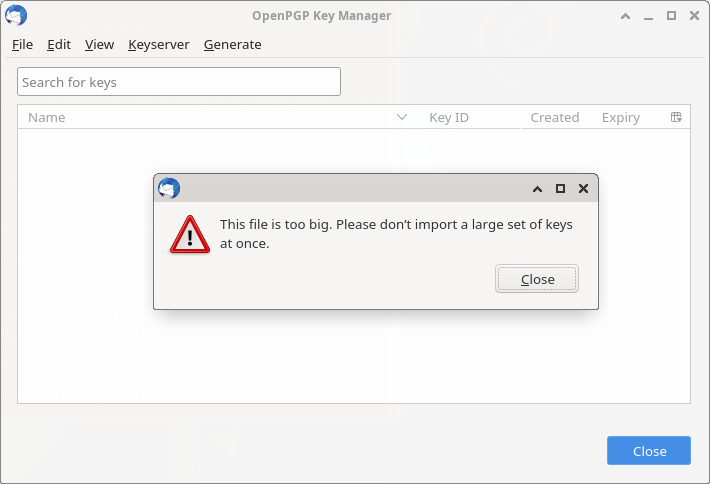
 5MB (or 4.8MiB) import limit. Sure. My modest pubring (111 keys) is 18MB. The Debian keyring is 28MB.
May be, just may be, add another 0 to that if statement?
So, until that happens, workarounds ...
Option 1:
Export each pubkey into a separate file. The import dialog allows to select them all in one go. But - of course - it will ask confirmation for each. So prepare some valerian tea.
5MB (or 4.8MiB) import limit. Sure. My modest pubring (111 keys) is 18MB. The Debian keyring is 28MB.
May be, just may be, add another 0 to that if statement?
So, until that happens, workarounds ...
Option 1:
Export each pubkey into a separate file. The import dialog allows to select them all in one go. But - of course - it will ask confirmation for each. So prepare some valerian tea.
 The
The 
 The following contributors got their Debian Developer accounts in the last two months:
The following contributors got their Debian Developer accounts in the last two months:
 From November 2nd to 4th, 2022, the 19th edition of
From November 2nd to 4th, 2022, the 19th edition of
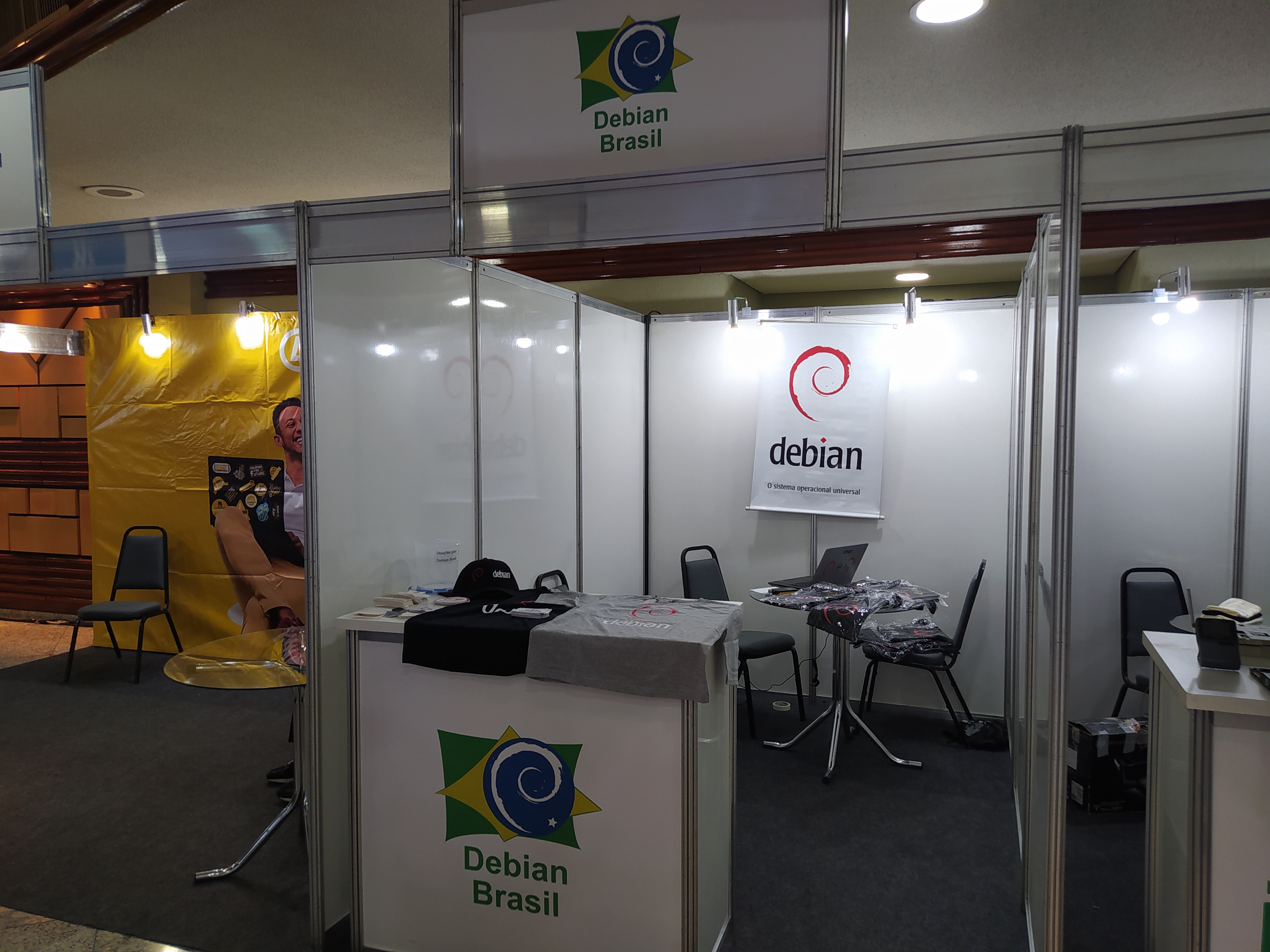 A huge number of people visited the booth, and the beginners (mainly students)
who didn't know Debian, asked what our group was about and we explained various
concepts such as what Free Software is, GNU/Linux distribution and Debian
itself. We also received people from the Brazilian Free Software community and
from other Latin American countries who were already using a GNU/Linux
distribution and, of course, many people who were already using Debian. We had
some special visitors as Jon maddog Hall, Debian Developer Emeritus Ot vio
Salvador, Debian Developer Eriberto Mota, and Debian Maintainers Guilherme de
Paula Segundo and Paulo Kretcheu.
A huge number of people visited the booth, and the beginners (mainly students)
who didn't know Debian, asked what our group was about and we explained various
concepts such as what Free Software is, GNU/Linux distribution and Debian
itself. We also received people from the Brazilian Free Software community and
from other Latin American countries who were already using a GNU/Linux
distribution and, of course, many people who were already using Debian. We had
some special visitors as Jon maddog Hall, Debian Developer Emeritus Ot vio
Salvador, Debian Developer Eriberto Mota, and Debian Maintainers Guilherme de
Paula Segundo and Paulo Kretcheu.
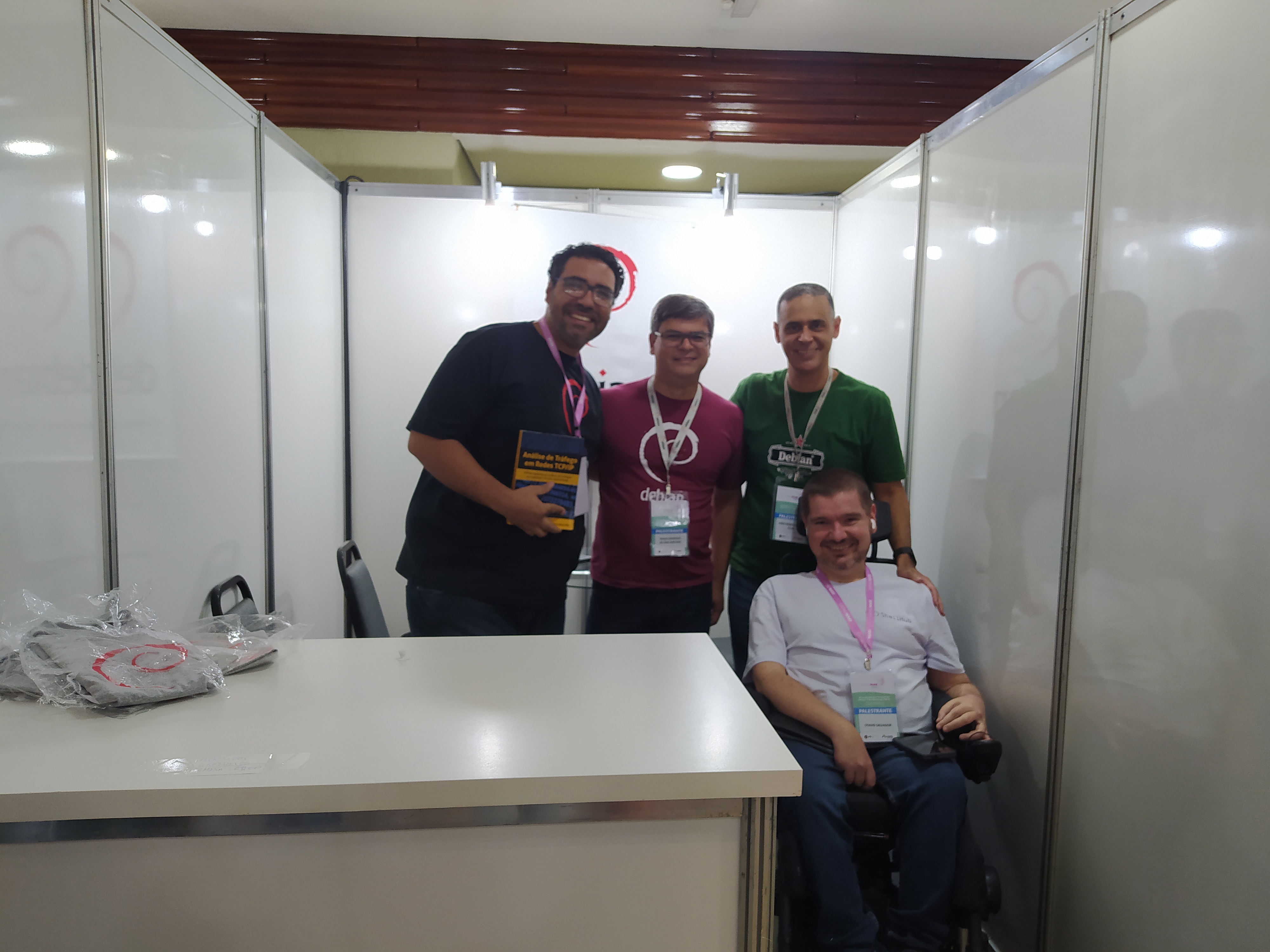 Photo from left to right: Leonardo, Paulo, Eriberto and Ot vio.
Photo from left to right: Leonardo, Paulo, Eriberto and Ot vio.
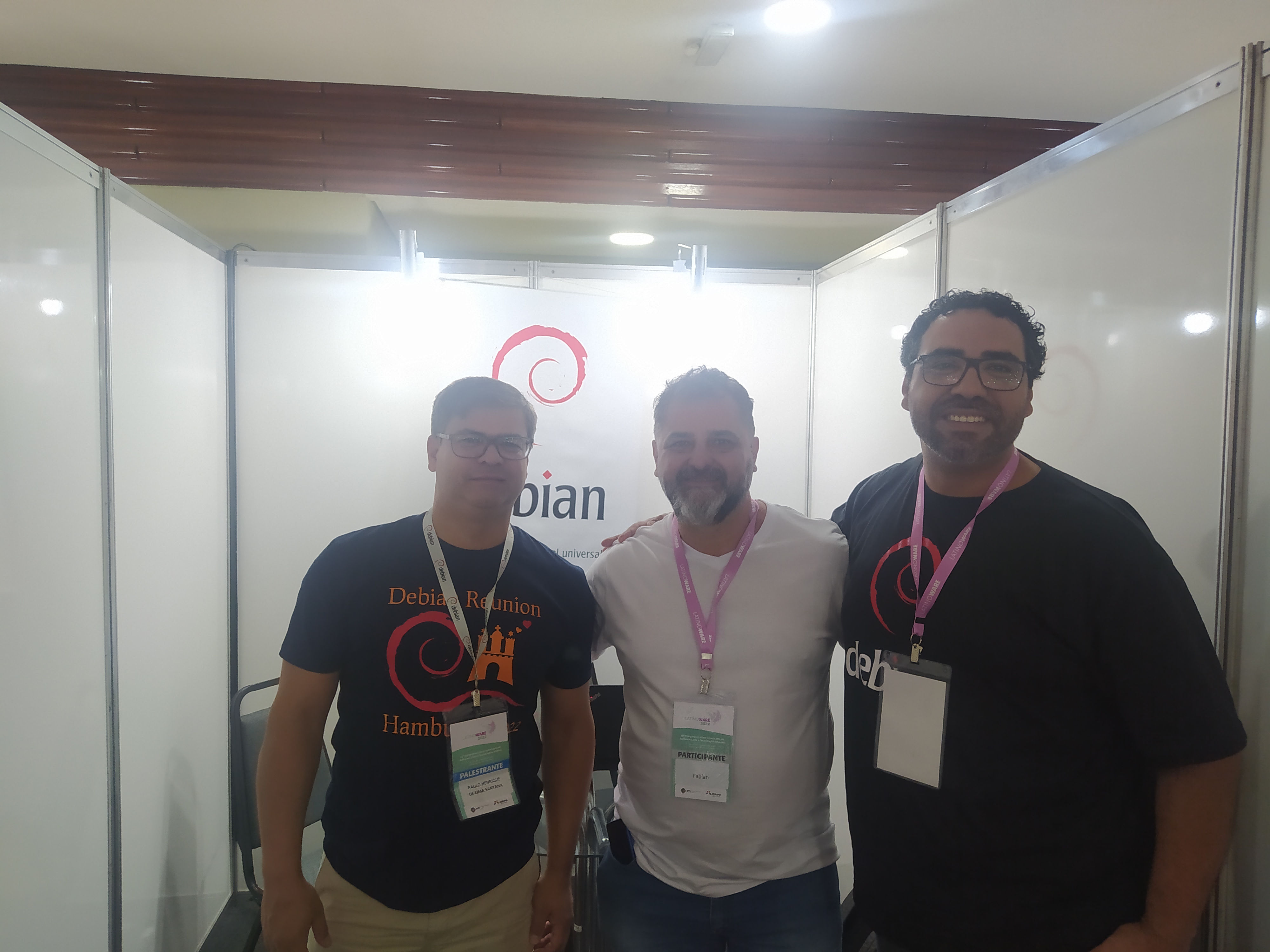 Photo from left to right: Paulo, Fabian (Argentina) and Leonardo.
In addition to talking a lot, we distributed Debian stickers that were produced
a few months ago with Debian's sponsorship to be distributed at DebConf22
(and that were left over), and we sold several Debian
Photo from left to right: Paulo, Fabian (Argentina) and Leonardo.
In addition to talking a lot, we distributed Debian stickers that were produced
a few months ago with Debian's sponsorship to be distributed at DebConf22
(and that were left over), and we sold several Debian
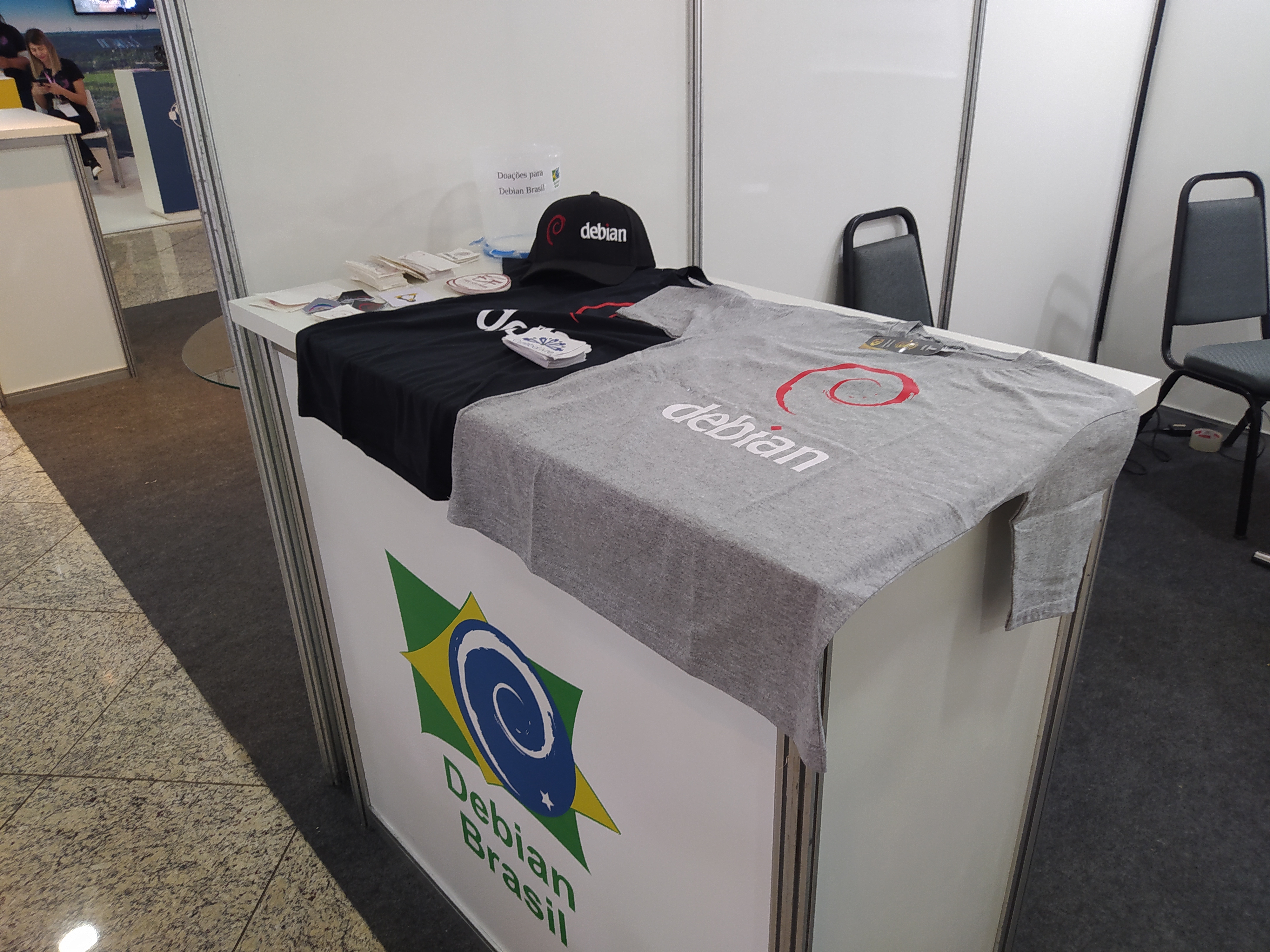
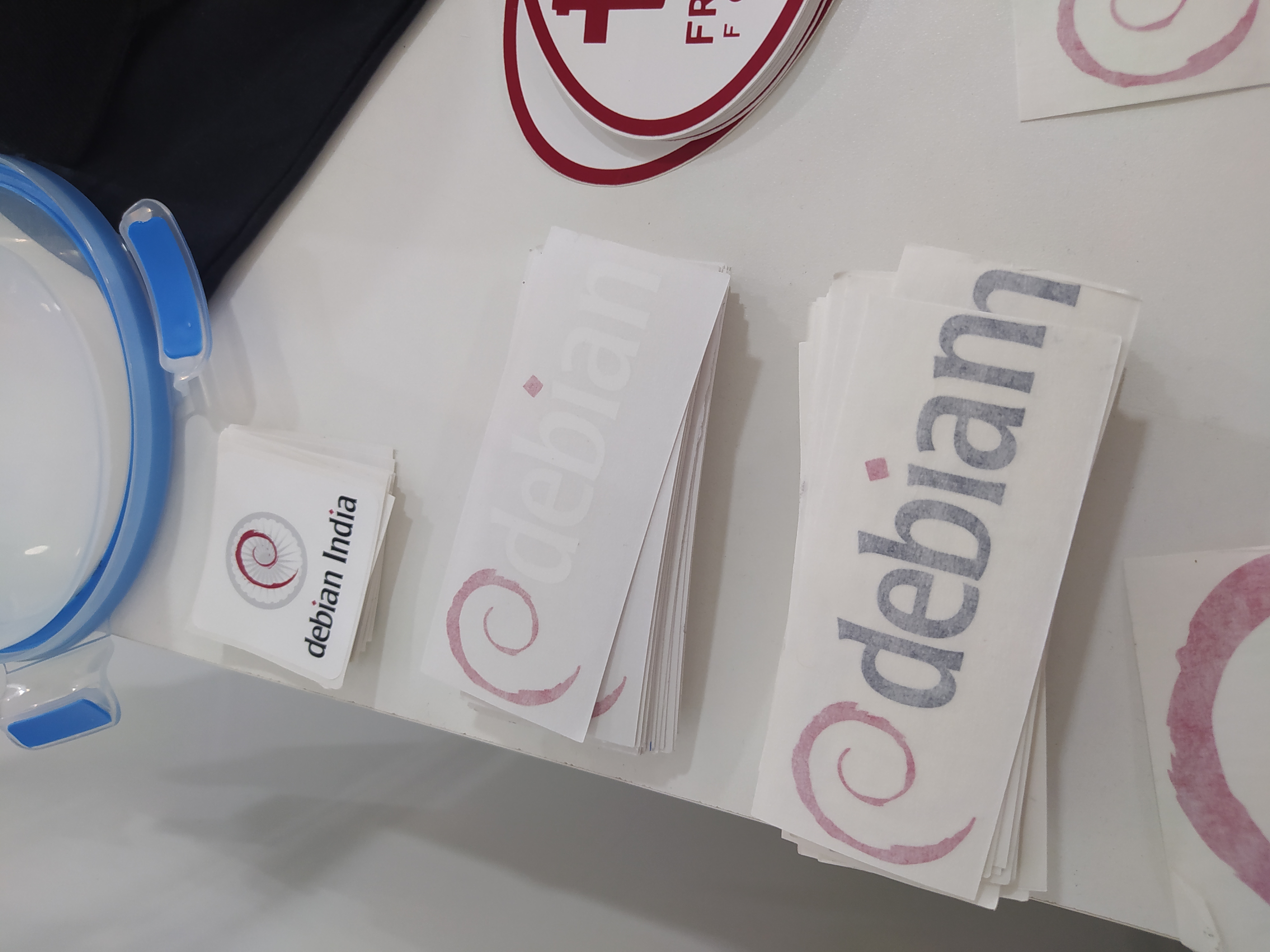 We also had 3 talks included in Latinoware official schedule.
We also had 3 talks included in Latinoware official schedule.
 Photo Paulo in his talk.
Many thanks to Latinoware organization for once again welcoming the Debian
community and kindly providing spaces for our participation, and we
congratulate all the people involved in the organization for the success of
this important event for our community. We hope to be present again in 2023.
We also thank Jonathan Carter for approving financial support from Debian for
our participation at Latinoware.
Photo Paulo in his talk.
Many thanks to Latinoware organization for once again welcoming the Debian
community and kindly providing spaces for our participation, and we
congratulate all the people involved in the organization for the success of
this important event for our community. We hope to be present again in 2023.
We also thank Jonathan Carter for approving financial support from Debian for
our participation at Latinoware.
 V rias pessoas visitaram o estande e aquelas mais iniciantes (principalmente
estudantes) que n o conheciam o Debian, perguntavam do que se tratava o nosso
grupo e a gente explicava v rios conceitos como o que Software Livre,
distribui o GNU/Linux e o Debian propriamente dito. Tamb m recebemos pessoas
da comunidade de Software Livre brasileira e de outros pa ses da Am rica Latina
que j utilizavam uma distribui o GNU/Linux e claro, muitas pessoas que j
utilizavam Debian. Tivemos algumas visitas especiais como do Jon maddog Hall,
do Desenvolvedor Debian Emeritus Ot vio Salvador, do Desenvolvedor Debian
V rias pessoas visitaram o estande e aquelas mais iniciantes (principalmente
estudantes) que n o conheciam o Debian, perguntavam do que se tratava o nosso
grupo e a gente explicava v rios conceitos como o que Software Livre,
distribui o GNU/Linux e o Debian propriamente dito. Tamb m recebemos pessoas
da comunidade de Software Livre brasileira e de outros pa ses da Am rica Latina
que j utilizavam uma distribui o GNU/Linux e claro, muitas pessoas que j
utilizavam Debian. Tivemos algumas visitas especiais como do Jon maddog Hall,
do Desenvolvedor Debian Emeritus Ot vio Salvador, do Desenvolvedor Debian
 Foto da esquerda pra direita: Leonardo, Paulo, Eriberto e Ot vio.
Foto da esquerda pra direita: Leonardo, Paulo, Eriberto e Ot vio.
 Foto da esquerda pra direita: Paulo, Fabian (Argentina) e Leonardo.
Al m de conversarmos bastante, distribu mos adesivos do Debian que foram
produzidos alguns meses atr s com o patroc nio do Debian para serem distribu dos
na DebConf22(e que haviam sobrado), e vendemos v rias
Foto da esquerda pra direita: Paulo, Fabian (Argentina) e Leonardo.
Al m de conversarmos bastante, distribu mos adesivos do Debian que foram
produzidos alguns meses atr s com o patroc nio do Debian para serem distribu dos
na DebConf22(e que haviam sobrado), e vendemos v rias

 Tamb m tivemos 3 palestras inseridas na programa o oficial do Latinoware.
Tamb m tivemos 3 palestras inseridas na programa o oficial do Latinoware.
 Foto Paulo na palestra.
Agradecemos a organiza o do Latinoware por receber mais uma vez a comunidade
Debian e gentilmente ceder os espa os para a nossa participa o, e parabenizamos
a todas as pessoas envolvidas na organiza o pelo sucesso desse importante
evento para a nossa comunidade. Esperamos estar presentes novamente em 2023.
Agracemos tamb m ao Jonathan Carter por aprovar o suporte financeiro do Debian
para a nossa participa o no Latinoware.
Foto Paulo na palestra.
Agradecemos a organiza o do Latinoware por receber mais uma vez a comunidade
Debian e gentilmente ceder os espa os para a nossa participa o, e parabenizamos
a todas as pessoas envolvidas na organiza o pelo sucesso desse importante
evento para a nossa comunidade. Esperamos estar presentes novamente em 2023.
Agracemos tamb m ao Jonathan Carter por aprovar o suporte financeiro do Debian
para a nossa participa o no Latinoware.

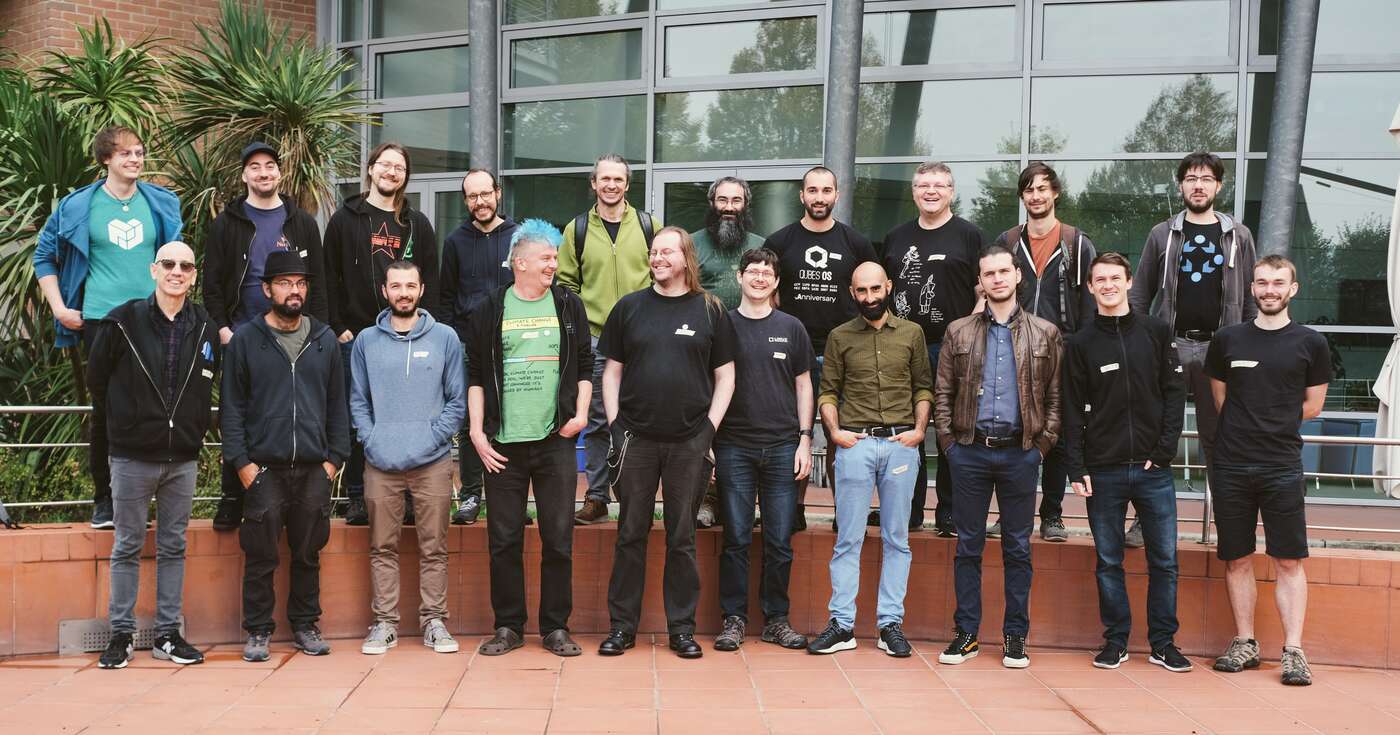
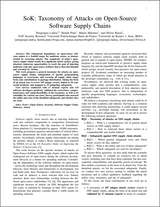





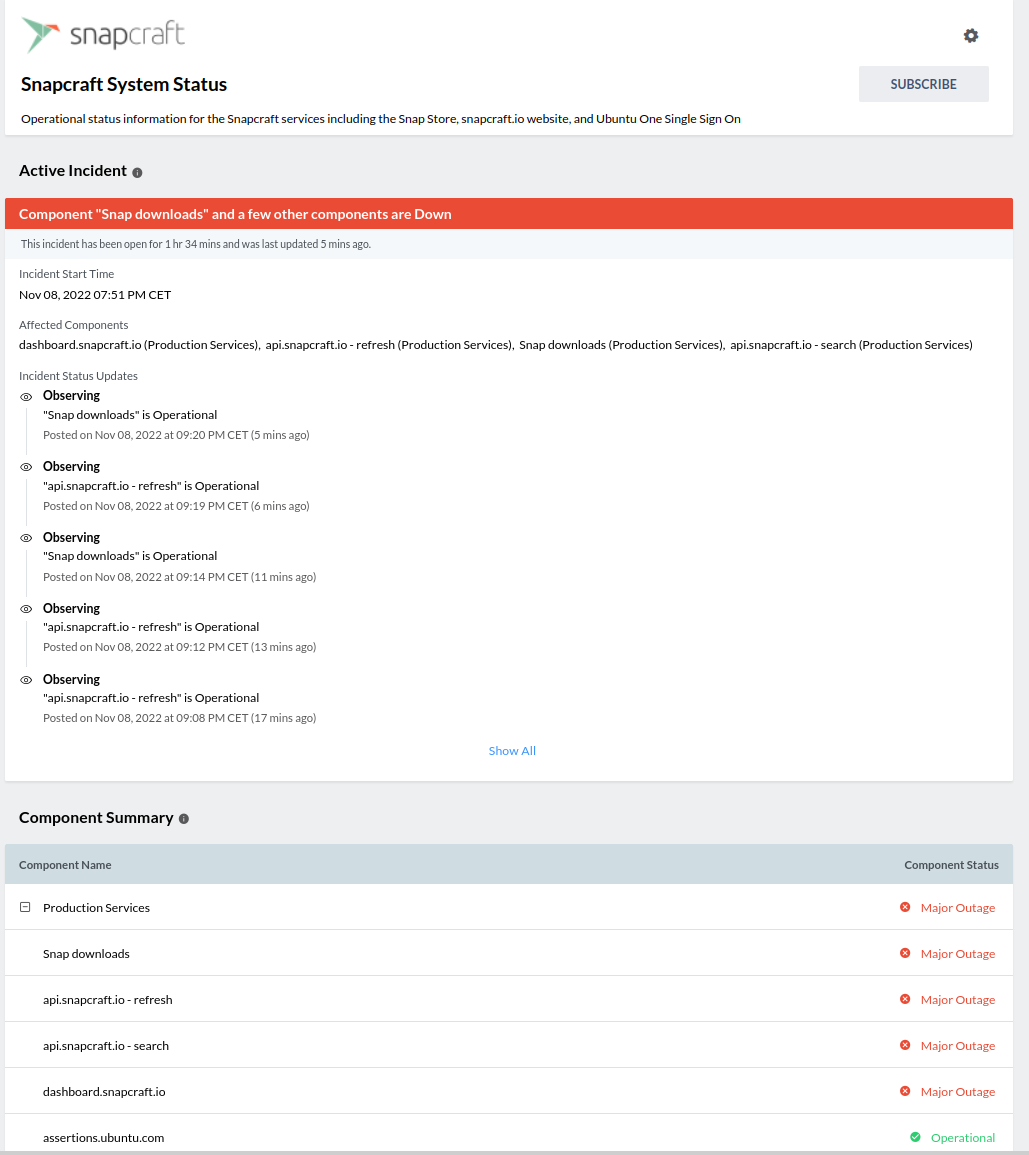
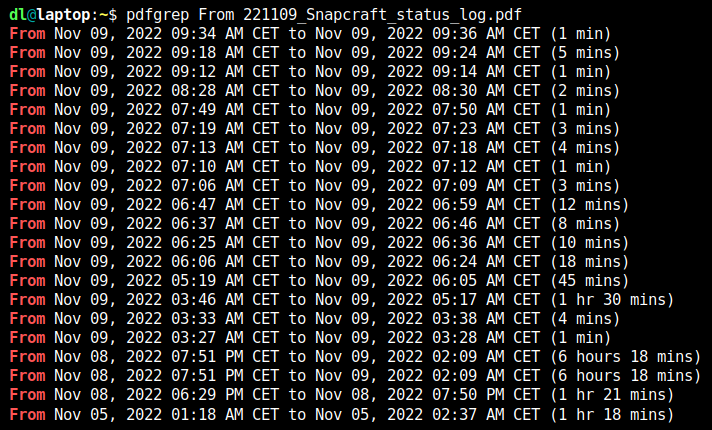 Bonus points for the bad client side implementation:
Bonus points for the bad client side implementation:
 Now, some user pages may have multiple valid RSS feeds because they contain multiple channels.
Remember the TED page from above? Well run:
Now, some user pages may have multiple valid RSS feeds because they contain multiple channels.
Remember the TED page from above? Well run:
 You probably want the last Channel ID listed above, the non-selective "TED" one. And that's the one from the example above.
Update
02.06.2022:
smpl wrote in and has the much better solution for the most frequent use cases:
You probably want the last Channel ID listed above, the non-selective "TED" one. And that's the one from the example above.
Update
02.06.2022:
smpl wrote in and has the much better solution for the most frequent use cases:
 These things are meant to be very consumer-style end-user devices. You log in with your Google account and everything works. Until it doesn't.
Just setting it up caused the first issue:
I was always thrown back to a black screen and then another login-screen despite having successfully logged in initially to create the "owner" user of the Chromebook. No error message, not useful UI feedback. Just logging in again and again and again.
The issue is ... not having a GMail account associated with my Google account. Duh!
So add a GMail.com address as the primary to your Google account and the initial setup completes.
Of course you cannot delete that GMail.com association again because the owner user is linked to the email and not the account. Well, you can delete it but then you cannot configure "owner" items of your Chromebook any more. Great job, Google. Not. Identity management 101 fail.
Kudos to
These things are meant to be very consumer-style end-user devices. You log in with your Google account and everything works. Until it doesn't.
Just setting it up caused the first issue:
I was always thrown back to a black screen and then another login-screen despite having successfully logged in initially to create the "owner" user of the Chromebook. No error message, not useful UI feedback. Just logging in again and again and again.
The issue is ... not having a GMail account associated with my Google account. Duh!
So add a GMail.com address as the primary to your Google account and the initial setup completes.
Of course you cannot delete that GMail.com association again because the owner user is linked to the email and not the account. Well, you can delete it but then you cannot configure "owner" items of your Chromebook any more. Great job, Google. Not. Identity management 101 fail.
Kudos to 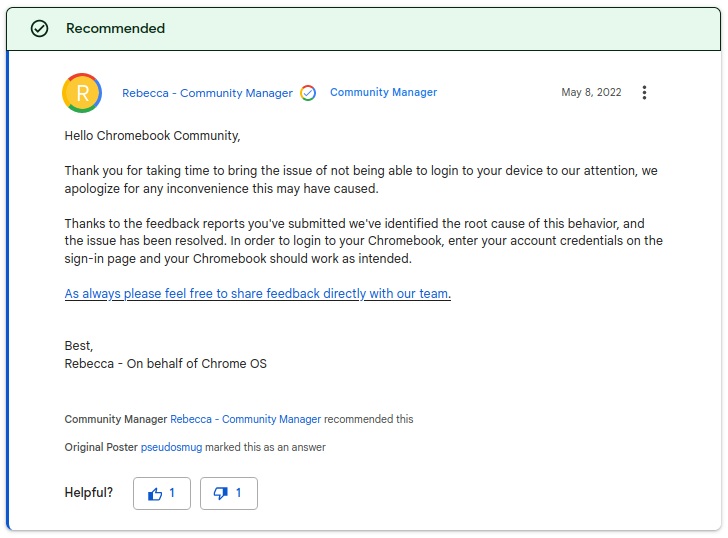 Once I was able to login to the new Chromebook all worked fine until I started to use ssh sessions.
These always hung for 30 seconds to 10 minutes and then resumed with lots of packets lost in between and the last minute or so coming in from buffering in a burst.
This was easy to see in
Once I was able to login to the new Chromebook all worked fine until I started to use ssh sessions.
These always hung for 30 seconds to 10 minutes and then resumed with lots of packets lost in between and the last minute or so coming in from buffering in a burst.
This was easy to see in 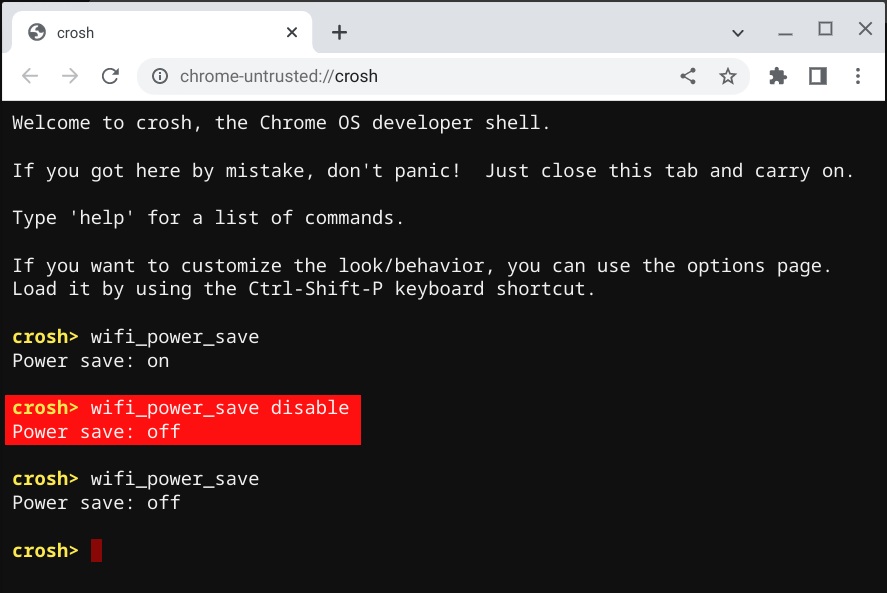 This unfortunately only lasts until the next reboot but it does persist over suspend cycles (aka closing the lid).
This unfortunately only lasts until the next reboot but it does persist over suspend cycles (aka closing the lid).
 I'm lucky enough to
I'm lucky enough to 